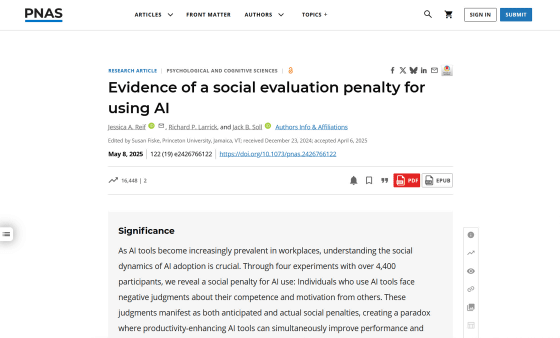Research results show that using AI makes people more likely to receive harsh evaluations from others

The performance of generative AI has improved dramatically in recent years, and more and more people are using it to improve their productivity at work. However, an experiment conducted by a research team at
Evidence of a social evaluation penalty for using AI | PNAS
https://www.pnas.org/doi/10.1073/pnas.2426766122

People who use AI may pay a social price, according to new psychology research
https://www.psypost.org/people-who-use-ai-may-pay-a-social-price-according-to-new-psychology-research/
The research team hypothesized that employees' use of AI might be perceived as a sign of incompetence or laziness, based on previous research showing that asking for help is likely to be perceived as a reflection of personal weakness rather than a situational need.
'I became interested in this topic after talking to employees at multiple organizations who were hesitant to use generative AI in the workplace, not because of the output, but because of the social dynamics that come with using AI,' said Jessica Reiff , lead author of the paper and a doctoral student at Duke University's Fuqua School of Management.
To understand how employees who use generative AI are perceived, the researchers conducted four experiments with more than 4,400 participants. In the first experiment, 497 participants were asked, 'How do you think your colleagues and managers would evaluate you if you used either a generative AI tool or a traditional dashboard tool?'
The results showed that participants who imagined using AI predicted they would be rated as 'lazy,' 'replaceable,' and 'less competent and hardworking' compared to employees who used non-AI tools, and responded that they would hide the fact that they use AI. These responses suggest that workers are aware of the stigma associated with using AI.

In a second experiment, 1,215 participants were asked to rate the characteristics of three employees: one who received help from an AI, one who received help from a human coworker, and one who received no help from anyone. The participants consistently rated the AI-assisted employees as lazier, less competent, less diligent, and less independent than the other employees.
'We were surprised to find that the social evaluation penalty in our study occurred regardless of the subject's age, occupation, or gender,' Reiff told PsyPost.
In the third experiment, one group of participants (801 people) played the role of a candidate, completing a visual task and reporting their daily AI usage. The other group (1,718 people) played the role of a recruiter, deciding which candidate to hire. The results showed that recruiters who did not use AI tended to prefer 'candidates who did not use AI,' while recruiters who did use AI tended to prefer 'candidates who did use AI.' This suggests that one's own experience with AI influences the evaluation of others who use AI.
In the fourth experiment, 1,006 participants were asked to evaluate candidates who applied for jobs that required either human intervention or digital completion. Some of the candidates reported using AI on a daily basis, while others used traditional tools like Microsoft Office.
The results of the experiment revealed that participants who do not regularly use AI were more likely to view candidates who use AI as lazy. This tendency was particularly strong when selecting candidates for tasks that require human intervention. However, when selecting candidates for tasks that are clearly better suited to AI, such as tasks that are completed digitally, this penalty disappeared, and candidates who use AI were rated slightly higher.

'The biggest lesson from this study is that the use of AI may come with a social cost,' said Reiff. 'Employees who were identified as using generative AI were rated as lazier, less competent, and less hardworking than employees who used other tools and resources to accomplish the same tasks. Ironically, while some employees are using AI because they are motivated to improve their productivity, the use of AI may lead to them being perceived as less motivating by other employees.'
in Web Service, Science, Posted by log1h_ik